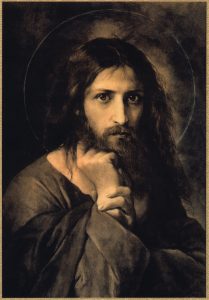“The cup of blessing that we bless, is it not a sharing in the blood of Christ? The bread that we break, is it not a sharing in the body of Christ? Because there is one bread, we who are many are one body, for we all partake of the one bread.” (1 Corinthians 10:16-17)
In these words of the Apostle Paul, we perceive the sacred mystery of the Holy Eucharist, the very centre of our life in Christ. The cup that we bless and the bread that we break are not mere symbols, nor are they common food and drink. They are the very Body and Blood of our Lord, given to us for the remission of sins and for eternal life. In the Divine Liturgy, we do not simply commemorate Christ’s sacrifice as an event of the past; rather, we enter into the timeless reality of His sacrifice, made present to us through the Holy Spirit.
From the earliest days of the Church, the Eucharist has been the bond of unity among the faithful, drawing all who partake into one mystical body. St. Ignatius of Antioch wrote: “Be diligent, therefore, to partake of one Eucharist; for there is one flesh of our Lord Jesus Christ, and one cup to show forth the unity of His blood.” In the partaking of the one bread, we are not simply individuals coming together; we are the Church, the Body of Christ, in communion with Him and with each other. For example, consider the image of the bread. Before it becomes the Eucharist, it is composed of many grains of wheat, crushed and kneaded together. These grains, though distinct, lose their separateness to become one loaf. So too are we, though many, united in Christ. Our divisions—whether of nationality, language, or status—are dissolved in the presence of the Holy Mysteries. In this, we see that the Church is not only a collection of individuals, but a divine reality, bound together by Christ Himself. Yet, to partake of the Eucharist is not a light matter. St. Paul also warns that “whoever eats the bread or drinks the cup of the Lord in an unworthy manner will be answerable for the body and blood of the Lord.” (1 Corinthians 11:27) This is why we approach the chalice with fear and trembling, with a heart purified by repentance and a soul yearning for union with Christ. The Eucharist is not a mere ritual or obligation; it is the mystical marriage feast of the Lamb, a foretaste of the heavenly banquet.
As Orthodox Christians, we must live in accordance with this sacred gift. If we are united as one body in Christ, then we must strive for peace among ourselves, casting aside anger, resentment, and selfishness. Just as Christ humbled Himself for our sake, so must we humble ourselves before one another. The Eucharist compels us to love sacrificially, to forgive freely, and to seek reconciliation. Our participation in the Eucharist is not confined to the walls of the church. We are called to carry the grace we receive into the world, becoming vessels of Christ’s love and mercy. Just as Christ offers Himself to us completely, so too must we offer ourselves in service to our brethren, especially the poor, the suffering, and those in need of compassion.
May we then approach the Holy Mysteries with awe and thanksgiving, knowing that in this bread and cup, we receive Christ Himself. Let us strive to live in a manner worthy of this great gift, so that we may truly be one body in Him. And let us pray that the unity we share at the Holy Table may be reflected in our lives, bearing witness to the love and peace of Christ in a divided world.
May the Holy Eucharist strengthen us, sanctify us, and prepare us for the eternal banquet in the Kingdom of Heaven. Amen.
May God bless you +
Fr. Charles
11 June 2023

Comments are closed.